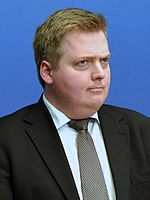Center Party (Iceland)
| Miðflokkurinn Center Party |
|
|---|---|

|
|
| Party leader | Sigmundur Davíð Gunnlaugsson |
| founding | October 2017 |
| Headquarters | Reykjavík |
| Alignment |
Nordic Agrarian Party Conservatism Populism EU skepticism |
| Parliament seats |
9/63 |
| Website | midflokkurinn.is |
The Center Party (common German translation of the Icelandic name Miðflokkurinn ) is a political party in Iceland . It split off from the Progress Party in 2017 . The party is closely associated with former Prime Minister Sigmundur Davíð Gunnlaugsson . In line with its political priorities, the party's program focuses on financial and banking policy as well as the country's rejection of EU accession . As with the Progressive Party, its topics are also largely geared towards Icelandic agriculture and the rural population. In the parliamentary elections in October 2017 , the Center Party emerged as the fourth strongest force with 10.9% of the vote.
history
The establishment of the Center Party is based on the political fate of Sigmundur Davíð Gunnlaugsson. The reform demands for the Icelandic banking system, which enabled the economist Sigmundur Davíð to rise to the position of chairman of the Progress Party in 2009, can be found today as central elements of the party's program, as is his skepticism about the EU. From 2013 he was Prime Minister of Iceland. In April 2016 he resigned because of his involvement in questionable financial transactions that were made public through the so-called Panama Papers . In September 2016 he was voted out of office as leader of the Progress Party.
At the end of May 2017, Sigmundur Davíð Gunnlaugsson announced the establishment of a "Progressive Society" (Framfarafélagið). For the time being, it should not act as a party, but rather as a kind of think tank uniting people from different political and professional backgrounds in order to develop proposals, particularly for Iceland's social policy. At the end of September 2017, he finally announced the establishment of the Center Party, which took place in early October. Sigmundur Davíð Gunnlaugsson ran as the Center Party's top candidate in the parliamentary elections on October 28, 2017.
Political positions
The known political positions of the party are based solely on the 2017 election campaign.
An important topic is the organization and reform of the Icelandic banking and financial market. The Center Party is calling for a general banking reform, for the Landsbanki to remain state property and for the state to take over shares in the Arion Bank (formerly Kaupthing Bank ) and distribute them in part to the Icelandic citizens. The state-owned shares in Íslandsbanki are to be sold to a foreign bank in order to increase competition in the sector. In addition, the Center Party is calling for value retention through indexing to be prohibited for certain types of credit, in particular for consumer and housing loans. The social security contributions for companies with up to ten employees are to be reduced.
The party wants to prevent Iceland's accession to the European Union, which is still being discussed as a possibility (the Sigmundur Davíð Gunnlaugsson government withdrew its membership application in 2015).
A more socially oriented housing policy is to be implemented through non-commercial housing projects and the granting of discounted housing loans. Residential construction projects in the cold regions of the country are to be exempt from VAT. People in need of care should receive better care through new inpatient facilities and the expansion of outpatient care services. The Center Party wants to concentrate education policy on technical training and study courses. She also calls for a revision of the student loan system.
In addition, the Center Party represents various demands of infrastructure and regional policy, including an improvement in ferry connections and Internet broadband provision , the construction of a new university clinic in Reykjavík and the planned airport in the Vatnsmýrin district. Icelandic agriculture, especially sheep breeding, as well as the tourism industry wants to move it into the center of economic development.
Further demands are the reorganization of the constituencies, more direct democracy and the expansion of electric mobility .
Chairperson
| Chairman | Period |
|---|---|
| Sigmundur Davíð Gunnlaugsson | 2017- |
Election results
| year | be right | percent | +/- | Seats | +/- |
|---|---|---|---|---|---|
| 2017 | 16,711 | 10.7% | + 10.7% | 7th | +7 |
A study by the University of Iceland on behalf of the daily Morgunblaðið showed in October 2017 that almost half of the Center Party's supporters had voted for the Progress Party in the previous parliamentary election , around a quarter for the liberal-conservative Independence Party and a total of 13% for the liberal- pro-European Viðreisn and the left-liberal Björt framtíð .
At the end of February 2019, two parliamentarians who were expelled from the Flokkur fólksin party in November 2018 as a result of the Klaustur affair joined the Center Party. The number of their seats has therefore increased from 7 to 9 in the 2017 election result.
Footnotes
- ↑ Rudolf Hermann: Iceland chooses a dead end . In: Neue Zürcher Zeitung . October 29, 2017. Retrieved November 3, 2017.
- ↑ Silke Bigalke: The new Iceland could be the old one . In: Tages-Anzeiger . October 29, 2017. Retrieved November 3, 2017.
- ^ Former PM of Iceland forms new progressive society , icelandmonitor.mbl.is, May 25, 2017
- ↑ Kosningaáherslur Miðflokksins ( Memento of the original from October 30, 2017 in the Internet Archive ) Info: The archive link was inserted automatically and has not yet been checked. Please check the original and archive link according to the instructions and then remove this notice. , midflokkurinn.is, October 15, 2017
- ↑ Baráttan verður snorp , mbl.is, October 9, 2017
- ↑ Kristín Ólafsdóttir: Karl Gauti og Ólafur gengnir til liðs við Miðflokkinn ( Icelandic ) In: visir.is . February 22, 2019. Retrieved July 15, 2019.